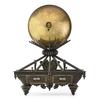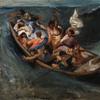Museum of Fine Arts, Boston, Deaccessions Eight Paintings to Acquire Nude by Gustave Caillebotte
- BOSTON, Massachusetts
- /
- September 19, 2011
The Museum of Fine Arts, Boston (MFA), has acquired the painting Man at His Bath (1884), regarded as one of the greatest works by artist Gustave Caillebotte (1848–1894). This important canvas represents the first Impressionist nude to enter the Museum's collection of paintings. The almost life-size work, which has been on loan at the MFA since April, is on display in the Esther and Sidney Rabb Gallery for Impressionism through September 25. It will also be among more than 160 works in the upcoming exhibition, Degas and the Nude, on view at the MFA from October 9 through February 5, 2012.
"Gustave Caillebotte's works are among the most striking ever created by an Impressionist painter. They're bold, unexpected, often with an ‘in-your-face’ quality that resonates with both the public and connoisseurs,” said Malcolm Rogers, Ann and Graham Gund Director of the MFA. “Man at His Bath is Caillebotte at his finest, not only visually striking but also beautifully painted. We are thrilled to be able to add this masterwork to the Museum's collection."
Man at His Bath was painted in 1884 by Caillebotte, one of the finest Impressionist painters of the 19th century, renowned for his scenes of urban life in Paris, whether on the streets or inside apartments. He is well known for such paintings as Paris Street, Rainy Day (1877, Art Institute of Chicago) and The Floor Scrapers (1875, Musée d’Orsay), scenes in which strong perspective and daring design illustrate Parisian daily life. Because he was wealthy, Caillebotte did not sell many of his paintings during his lifetime, but collected numerous works by his contemporaries, including Paul Cézanne, Edgar Degas, Edouard Manet, Claude Monet, Camille Pissarro, Pierre-Auguste Renoir, and Alfred Sisley.
Man at His Bath, measuring approximately 6 x 4 ½ feet, pictures a rear view of a man drying himself, his clothes neatly folded on a chair near a curtained window and copper tub. The painting may not have been viewed by a large audience until nearly a century after its completion. It traveled to Brussels in 1888 to be exhibited by the vanguard organization Les XX (“The Twenty”), where it appears to have been removed from the general exhibition and shown privately to only a few visitors. Man at His Bath is the second Caillebotte painting to enter the Museum’s collection, joining Fruit Displayed on a Stand (about 1881–82), generally considered Caillebotte's most original still life painting, which the Museum purchased in 1979.
Caillebotte died at the age of 45 in 1894, leaving many works in his collection of masterpieces by his fellow Impressionists to the French state. Included in his estate were pastels of nudes by Degas, the first works by the artist to enter that nation’s collection—two of these will be shown in Degas and the Nude. Man at His Bath passed to the artist’s family in Paris, who sold it to art dealers Brame et Lorenceau. In 1967 it was acquired by a private collection, which recently sold it to the MFA.
"For 15 years, I've had the rare privilege, as well as the profound responsibility, to care for one of the world's greatest groups of French 19th-century paintings,” said George T.M. Shackelford, Chair, Art of Europe and Arthur K. Solomon Curator of Modern Art at the Museum. “It's hard to think of ways in which the MFA’s Impressionist collection could improve. Adding a work like this one gives an indoor, urban accent to a collection that is dominated by the sun-drenched pastoral art of Monet, Pissarro, Renoir, and Sisley. With Man at His Bath, building on great strengths in the work of Manet and Degas, we've added another icon to the collection."
Man at His Bath was purchased by the Museum with funds by exchange and from the Charles H. Bayley Picture and Painting Fund, Edward Jackson Holmes Fund, Fanny P. Mason Fund in memory of Alice Thevin, Arthur Gordon Tompkins Fund, Gift of Mrs. Samuel Parkman Oliver—Eliza R. Oliver Fund, Sophie F. Friedman Fund, Robert M. Rosenberg Family Fund, and the Mary L. Cornille and John F. Cogan, Jr. Fund for the Art of Europe.
In order to purchase the masterpiece, the MFA is deaccessioning eight late-19th-century works from its European paintings collection, which will be sold at auction through Sotheby’s, New York. (The Vereshchagin will be sold November 1 and the seven French works will be in Sotheby’s November 2 sale.) The eight works are:
• View from the Artist's Window, Eragny, 1885, Camille Pissarro
• Overcast Day at Saint-Mammès, about 1880, Alfred Sisley
• Gust of Wind, 1899, Maxime Camille Louis Maufra
• Forest Interior (Sous-Bois), 1884, Paul Gauguin
• The Fort of Antibes, 1888, Claude Monet
• Bust Portrait of a Young Woman, about 1890, Pierre-Auguste Renoir
• Saint-Mammès: Morning (Le Matin), 1881, Alfred Sisley
• Pearl Mosque, Delhi, late 1880s, Vasily Vereshchagin
Man at His Bath will be on view in Degas and the Nude to illustrate Degas’s work within the broader context of his forebears, contemporaries, and followers in 19th-century France. In addition to Caillebotte, these include works by Jean-Auguste-Dominique Ingres, Eugene Delacroix, Mary Cassatt, Pierre-Auguste Renoir, Henri Toulouse-Lautrec, Henry Matisse, and Pablo Picasso. As the first museum exhibition devoted exclusively to the extraordinary range of nudes by Degas, Degas and the Nude will offer a groundbreaking examination of the artist’s concept of the human body during the course of 50 years. Co-organized by the MFA and the Musée d’Orsay, Degas and the Nude is the first museum exhibition devoted exclusively to Degas’s nudes. It will include more than 60 works from the Orsay, the single largest lender, which has become the world’s greatest repository of Degas’s depictions of the nude in paintings, pastels, drawings, and sculpture. After the exhibition concludes at the MFA, it will be on view at the Musée d’Orsay from March 12–July 1, 2012.

100x100_n.jpg)
100x100_c.jpg)













100x100_c.jpg)